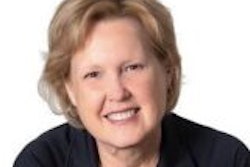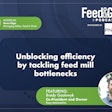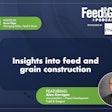Steven Kilger, managing editor of Feed & Grain Magazine and host of the Feed & Grain Podcast, talks with Jason Wheeler and Roger Gattis, merchandising specialists for White Commercial Corporation. Wheeler and Gattis are co-hosts of The Elevator's Cut, a fun, honest podcast about grain merchandising. They talk about grain merchandising challenges, give advice to new grain merchandisers and give a few tips on what to look out for in 2023.
Steven Kilger 00:00
Hi everyone. My name is Steven Kilger, Managing Editor of Feed & Grain and the host of the Feed & Grain podcast. Thank you so much for listening!
Steven Kilger 00:06
We have two great guests today, Jason Wheeler and Roger Gattis, merchandising specialists for White Commercial Corporation and hosts of their own podcast, The Elevator's Cut. Now, The Elevator's Cut is phenomenal. And anyone who's got any interest in grain merchandising really should check it out. I really enjoyed our conversation, and it was a blast. And I hope you do, too, as you listen to it.
Steven Kilger 00:28
If you're listening to this podcast and a podcasting app, please consider subscribing. And leaving a review really helps us out. If you have an idea for a topic, you would like me to cover, or someone in the animal feed, grain handling, or any related industry like that, that you think would be a good guest. Let me know. There's a contact button at the top of this podcast page on feedandgrain.com. And on every podcast page, that will allow you to email me directly. I'd love to hear from you. I'd love to get your ideas and your thoughts on the podcast and how we can make it better. But that's enough housekeeping for now. Thank you again for being here and listening. And let's go on to our conversation. Well, thanks for joining me today, Jason and Roger.
Steven Kilger 01:09
I mean, I feel like I've known you guys for years now, as White Commercial Corp. has been writing an article for Feed & Grain, every issue for three or four years. And you guys have written a couple. But can you tell me and the listeners a little bit more about yourselves and what you guys do?
Roger Gattis 01:28
Sir, yeah. Thanks for having us on, Steven. It’s kind of nice to be on this side of the microphone, as they say, to be the lower drag thing.
Steven Kilger 01:39
You don't have to edit later. So that's nice.
Roger Gattis 01:44
Yeah. So, Jason and I, as you said, we work for White Commercial, and we are grain merchandising specialists, which is a fancy way of saying we help people in the commercial grain business, merchandise their grain, merchandise it better, help them find financing, train their staff. We are a brokerage company. But we like to think of ourselves as an education company first and foremost. So that's, so our day-to-day is talking with country elevators, all sizes, but you know, our bread and butter is probably the mid-sized private elevator out there in the country. And you know, talking with those folks and helping them through whatever it is. They've got on their minds basis related spreads related. Trucker related. I just need to vent. You know, we do it all.
Jason Wheeler 02:37
Yeah, I'd say we work with about between 250 and 300-grain companies across US and Canada and all over. And yeah, most of them are probably private. But we do have a good amount of co-ops. And that's just, I guess, by the nature of the thing. Co-ops seem to keep merging. So, there's less and less number of co-ops, but they get they get bigger. But yeah, it's a fun business. And we're probably known in the industry as the education training people. Sherry Lorton and Don White wrote what used to be called the Merchants Edge. And now it's called The Art of Grain Merchandising book. It's a textbook that's used by a lot of folks in the industry to train new people and stuff. So, we're proud of that. We're proud that we're known as education people. And we're good at that. And we're good at training. But you know, we also do a lot of, like, like Roger was saying, the consulting that comes along with running a grain business. We have merchandising, financing, accounting, that sort of stuff. Roger and I operate more on that side of the business also. So anyways, that's why in we're a futures brokerage company is how we earn our money. So that's, that's the whole deal.
Steven Kilger 03:54
Well, I always really like your articles because they're ... Okay, full disclosure. I've taken a lot of like sessions, you know, trade shows have sessions on grain merchandising, and what you have to do, and I've taken a lot of those and I, I feel like I always understand grain merchandising, for like, the time I'm in the class to about 30 minutes afterward, everything is gone. So really, I love your articles, because they're very practical. They're written really well to be understandable. You're not just, you know, you're not just giving throwing numbers at people, which I, someone who admittedly isn't a great word that I, find really helpful, especially because they tend to be kind of practical towards a lot of different aspects of your life. A lot of you know how to sell and how to do things like that. And so those are always really great. But for layman out there, what are some of the misconceptions people have? What's the most common misconception people have about grain merchandising?
Roger Gattis 04:52
I think we would be remiss, not to mention the fact that the podcast Jason and I put on is called The Elevators Cut. And probably could be the biggest misconception is that whatever the basis is that the elevators pay in is how much they're making per bushel on whatever they're buying from the farmer. So, if they’re at 80, under for beans at harvest, they made 80 cents. Right, which could be true, but in the majority of cases is patently false.
Steven Kilger 05:28
Yeah. Well, that makes sense to me. I mean, and that seems to be a lot of the struggle with merchandising in general, is communicating with the ultimate customers of grain elevators, right, the farmers and explaining to them what you do and why you're trying to, you know, lock in prices and stuff a year before they want their crops in.
Jason Wheeler 05:49
Yeah, it's, like you say, a difficult thing to communicate with farmers. And it seems like there's a lot of mind power put into it, of how are these people making money out, they're doing some sort of thing to make money off of me. And like Roger said, the easiest thing is, if you know, you're 70, under basis, you must be making 70 cents, you know, well, the elevators probably reselling too, you know, some user for 50 under that day, you know, and got freight in it, and all that sort of stuff. So, there's, it's not really as simple as that, but, but you know, I get it in that way, you're not making it, you're delivering a grain elevator, you're not making some new product, you're taking my product and then reselling it, right, you're a middleman. And so, there's that. I don't know. We’re in these days where it's like, hey, we got to be more efficient, eliminate the middleman and all that stuff. But just logistically, the way our business works. There's the all the grain needed for the entire year comes at one time, and it's needed the, you know, the whole rest of the year, it's got it, somebody's got a hole to sit somewhere.
Roger Gattis 07:01
Until there's, you know, teleporter beams and things like that is this elevator is going to be here, and you know, elevator in the sense of, there's somewhere that grain is sitting that someone has paid someone else for and is waiting to move to somewhere and it doesn't matter, you know, whether it's a farm bin, commercial bin, it's the same skills apply to any grain that is not been turned into its final product yet.
Jason Wheeler 07:26
Yeah, and I say the grain elevator that exists now, you know, the 99% of the ones that are left have accepted the fact that they don't know what prices are going to do, hopefully. And so, they stay hedged and, you know, they trade the bases, which is a wonderful thing because it allows an elevator to buy corn for $7 and sell it for $5 and still be successful. So, they don't have to compete against everybody on prices. They can just trade on this basis; that doesn't move a whole lot in a year. I know it seems to move more these days, but it doesn't move a whole lot in a year versus what the prices do. So, it's a way for them to remain successful and over the years without a ton of risk.
Roger Gattis 08:21
It's how you get paid for providing service without taking it out of either customer's pocket.
Jason Wheeler 08:25
Like, that's the goal.
Steven Kilger 08:27
Yeah, cuz ultimately, everyone wins in that situation. Right?
Steven Kilger 08:32
Yeah. You're still making cash, as is the elevator.
Roger Gattis 08:36
Yeah, it's amazing. It's the farmer can make money, the elevator makes money, the truck driver that hauled it to the poultry processor makes money, the poultry processor magically turns corn and chicken nugs, and they make money, and they send it to the grocery store, and the grocery store makes money. And despite inflation, we're still buying some of the cheapest food on the planet today. So, it's a pretty amazing system when it works as intended. The bankers are really making money. They're the ones they ought to be, you know, going after the bankers cut.
Jason Wheeler 09:09
God bless them. We need the money.
Steven Kilger 09:11
T that’s true. Yeah. It's funny. That's a good point about the cheapest food too because a lot of people’s inflation is on the rise. And it's no joke, and anyone who's hurting for it is, you know, that's terrible. But when you look at like European food prices and things like that, you're like, oh, yeah, it's still pretty cheap here for our, you know, three-pound baggage.
Roger Gattis 09:35
Exactly.
Jason Wheeler 09:36
Yeah. They need more basis traders in Europe, I guess, right, Roger?
Roger Gattis 09:40
This guy knows.
Steven Kilger 09:42
So, what advice would you have for anyone kind of starting out in the grain merchandising role? Hopefully, we'll be getting a lot of new people to come work for us, and they'll need advice.
Roger Gattis 09:55
I would say, you know, the piece of advice is to don’t assume that people that's been in the business doing it a long time, or that work happened to work for one of the big companies, knows everything there is to know about grain merchandising. That is not true. Don't be intimidated by people just because their LinkedIn service or what company they work for can be true. But again, it's time, and time again, I've found through my time at the elevator and on this side of the bushel that there's a lot to be learned out there. And that's fine. That's what we're here to do. But don't assume that everybody knows a whole lot more than you do. Because it's, you know, it's not a safe assumption.
Jason Wheeler 10:40
Yeah. I'd say, I guess there are a few ways to go with this question. But for so on the merchandising side of things, if you're new to merchandising, hedging, and basis trading, and so to speak, one of the hardest things at the beginning is separating the concept of price and basis from each other. It's like, well, of course, I know, those are different things. But you get to think in like, oh, we're out of such and such, I guess prices are going up, but maybe you're talking about basis and vice versa. Don't. I guess they're two different languages, so to speak. So, so separate, and that's really good.
Jason Wheeler 11:17
The but as far as, like, just career advice, like Roger was saying that the reason he said, people do assume people have been in the business a long time, do assume like, oh, you work for, you know, ABCD company, you must know a lot, you know, you've been there a couple of years? Well, that company does know a lot as an institution. But just because you work there doesn't mean you do you get, you know, some small part of some role, you know, some people have different roles and bigger than others. We work with university kids a lot. And Roger and I help teach a course at the University of Arkansas, and, you know, they're the folks are starting out careers, Hey, should I consider this and I consider that, and I'd say, you know, if you're pursuing the money route, you know, in your career, you start with one of the big companies, you only had to work there a year or two and then go submit a resume to, you know, some co-op board or private elevator that and you got one of those big company names on your resume. They're like, oh, man. This guy must. No, ever; they just attribute all the knowledge of that company to you. Because you worked there a year and a half, you know, it's great, but
Roger Gattis 12:34
Use it to your advantage, you know, that’s the thing.
Jason Wheeler 12:35
But if you want to learn more quickly, earlier in your career, that's not the path to go. Because, like I said, you get one small thing to do, usually it's origination, which is a vastly important tool, in very crucial in a grain company, but you know, you're not going to learn, managing spreads and getting your hedges in, and you know, managing your position and the cash flow and the accounting and all the stuff that goes along with it, you're not going to learn it. But if you work at a small at a, you know, private elevator or, or co-op locally where you're having to manage, you'll have to manage all that logistics that you name it. So, transportation. So, it's, you get a lot more breadth of knowledge working at a, you know, at a country grain elevator, in my opinion.
Steven Kilger 13:25
Yeah, I'd imagine you get a lot more experience of just how elevators run as well when you're when you're at a small elevator in a location, and you're, you know, actually getting lunch with the guys versus being in some corporate office.
Roger Gattis 13:43
Good and bad.
Steven Kilger 13:44
Not to say anything against, you know, the ABCDs because those are, they're great. And please, continue to let me in your facility so I can tour it. So, everything seems to be changing with grain elevators. And it seems slower than other industries sometimes, but there have been like huge technological advantages and advances and things like that over the last, you know, 10-20 years. What have you kind of seen that's changed in merchandising over that ten-year period?
Jason Wheeler 14:22
Well, they're great merchandising podcasts. Now that's one technological advancement.
Steven Kilger 14:28
Do you know one of you could recommend it?
Jason Wheeler 14:32
I say yeah. But now there's tons of changes logistically like you're saying with technology, that's the easy one. With every industry, it's really advancing, and honestly, I've even seen some things in the last couple of months coming down the pipe that seems to make, you know, it could be making our industry even more efficient. I always think it's like the most efficient industry in the world that grain because of basis trading. It makes it so efficient. But then, then I see, you know, advanced, and I'm like, wow, that can make it even better. You know. So, the technology things, the easy one, you know, farmers are the apps and selling on their phones, and there's, you know, auto hedging and all this sort of stuff, which is, which is good advancements, I'd say.
Jason Wheeler 15:20
But the big changes from tests, I started in oh, five, Roger, a couple of years before that, and the big changes are, so from a merchandising standpoint, is back then, and you know, ten years ago, or whatever, it's, you know, most years, you get a carry in the market. And at least until you know, mid-summer or something, then maybe it you get an inverse after a flat market. Now, for three years running, we've had flat or pretty much inverted markets the whole way. And now interest rates are going stronger. So, it costs more than ever to carry its prices are high. There's, there's, I think that's a lot of that's demand-driven. We haven't had just awful crops or anything last few years; it’s a lot of demand, which is probably good. It's always good to have things that people want. And so, people, if there's high demand, that's good. But anyways, so I think the merchandising has changed in that you really have to be sharp managing, you know, the spreads, the deferred deliveries and all that stuff. Being more aggressive on selling out into the future is what I've seen lately. And I don't know. You hesitate to say, over the years, I, I get worried when things happen, like, '08 and '12, you know, we had a drought, '08, you know, everything went up. And I talked to older people like yeah, you know, this sort of stuff, it happens from time to time, and it's cyclical, it comes back, you know, and they always end up being right, but I freaking out the whole time, you know, and now it's like, well, it's three years in a row. And, you know, I'm, I'm never willing to say like, well, this is just how it is now. And it's always going to be this way. I've taught me that's not usually the case. But this is higher demand, merchandising.
Roger Gattis 17:13
My thought on this, Steve is kind of ancillary to like merchandising. In general, it's the demographic makeup of who is getting into the merchandising field. And again, adjacent imaging, you know, we do some work at the University of Arkansas, and the students that are taking the classes we help with. And we've been open for at least ten years, or maybe a little longer, has changed from, hey, you know, ten years ago, it was all male farm kids from, you know, East Arkansas farms that came in to get a little experience on basis trading and how it works. And probably half of them are better go back to the farm and use it for grain marketing, while some go on and industry. But now, you're seeing the folks that come into these classes and graduate. One, they're not all from the farm. They're. Actually, I think the kids from the farm are almost in the minority. Now you're seeing people from they might be from a rural areas but not a farm background. But a lot of folks from urban areas, and the demographic shift from all males is, you know, at least half and half male, female. And there's some years where we have, you know, more females in the class than males. And in the overwhelming majority of the folks that come out of that program are getting hired by grain companies and going on work. And so, it's, we've seen that shift as well, who is making up the population of grain merchandisers out there. And as more and more of the baby boomer generation retires, this trend is probably only going to increase because there's a dire need for skills out there, and the people that are willing to learn are being picked up pretty easily.
Steven Kilger 18:55
Yeah, yeah, that's, that's a good point. You see it at trade shows too, when you see them, you know, they have student days and things like that. You’re seeing more and more diverse female students, which is really nice when, like, 50% of the people coming through are females because that's what the population is. And that's really nice to see. And you're also starting to see, well, let's face it, it's getting really hard if you have that old idea of, oh, I want to farm someone with a farm background to work at the elevator. It's getting really hard to do.
Roger Gattis 19:30
Especially with high prices.
Steven Kilger 19:31
Yeah, exactly. Like you're just not finding them. So, it is really nice to see. Speaking of high prices, we talked a little bit about inflation and all the other like terrible storm of economic problems that seem to be coming together at once. What do you see as kind of the challenges your merchandisers are going to face over this next kind of unpredictable year?
Jason Wheeler 19:56
Yeah, well, as I said earlier on, with The spreads being inverted corn and beans the rest of the way here, which we're it's December and, you know, we're already inverted for the rest of the year pretty much in both commodities pretty severely so, and we got higher interest rates than ever and high prices. So it's going to so as an as a grain merchandiser, elevator holding inventory, it costs you a lot, you know, depending on who you talk to, and interest rates and how they figure it eight to 10 cents a month in cost to carry a bushel of beans, which is crazy, and the carry, there is no carry to pay you to compensate you for that. So, can bases make it up? Probably not. So, you know, it's one of those things.
Jason Wheeler 20:46
So, in particular, my answer to this question is on beans. Early in this season, we saw tremendous margins on beans, guys buying beans and reselling them, you know, even just a month or two down the road for JFM delivery with good like after, after freight and everything good margin, but some of the best margins they've ever sold, just selling them as they're buying them, but for deferred delivery. And so that's really good. So, they got off to a really good start. And they feel like we're in good shape. You know, now let's see how basis how good Could it really get got this good this early? It always gets better later, right? Well, no, especially not with a market structure like this. So, I anticipate all those really good margins that happened early were great. But I worry that guys are going to give it all back. I think folks are going to lose a lot of money on beans that want to try to carry them too long this year. That's what I foresee with the interest cost in the spreads what they are.
Roger Gattis 21:50
I'd say the big challenge, too, is just a continuation of the logistics issues. I mean, this past year, you had, you know, threats or railroad strike shortage of truckers high diesel, Mississippi River, pretty well drying up to a trickle, you know, so an a day delay in any of those modes of transportation takes more than a day to get back to normal. And so, we've been going on, you know, months with the river issues, years with the truck and rail issues now. So, you know, there's no reason to expect that to change going forward. And I think the merchandisers are going to have to balance the margin against logistics. And they kind of do that every year. But this year seems like it's going to be more compressed. Because once trucks start moving for other things like fertilizer in the spring, and once other stuff, there's less availability. And then, when all the farm bushels do hit the market, guess what happens at an end user whenever a spot sale is made by a farmer, he gets to deliver that bushel. If you've got a contract you've made prior, you're probably going to get a call from the buyer, and they'll say, Hey, can you wait till next week to deliver? And that happens all the time. So, I think to get ahead of that logistics log jam is going to be the challenge going forward through the spring and summer for most merchandisers.
Steven Kilger 23:15
Yeah, I don't it's it sounds like a rough year. I don't envy it that certain, but oh, well, let's get cut to the chase. If people want to kind of keep up to date with the newest news and merchandising and talk a little bit about what's happening. I've heard of this great little podcast that you guys do called The Elevator's Cut, which I've listened to a few episodes of, and I have to say it is amazing because you guys really do. It's fun. It's entertaining to listen to, but also you give a lot of information. Can you guys talk a little bit more about The Elevators Cut?
Roger Gattis 23:53
Well, they still let us do it. No, it started out as a project of catharsis. And years ago, there was a news reporter somewhere around Wichita interviewing a farmer about the local crop that year. And it started out as a good broadcast because they were talking about wheat, and they were standing in a Milo field that was the first giveaway. But then they get to talking about, you know, it was a year when we futures got high, so bases backed off, which is pretty normal. And you know, they started talking about the elevator, the basis for the elevators cut, and it was just they were synonymous, rife with inaccuracies. And, of course, ag Twitter blew up the next day and week. Jason and I kind of took that and said, you know if this is when you know, the podcasting thing was kind of ramping up was like, you know, if we ever do podcasts, we least have a name for it. It'll be the elevators cut. And so, lo and behold, three or four years down the road. This this thing happened. We found a microphone and a storage closet and just ordered recording. It's just been nothing but magic ever since then, and Pringles.
Jason Wheeler 25:04
Now it's been a fun run, and yeah, like I said, for a few years, we've been doing. We started, you know, we will let's, let's work through some concepts and get kind of educational but have fun with it, you know. And then we got through all the, you know, the three things Roger and I know about, and we're like now what do we do some fun, real fun interviews, we got to, you know, meet and, and establish relationships with all sorts of cool people and including a guy we interviewed from England on the podcast. Somewhere in the UK. I don't know. They have a bunch of territories. I don't know how it works over there. Wales, their thing there? I don't that's an animal. Okay. They have a thing, but anyway. Anyway, so we got to meet him, also guy and lots of other folks. So, we like to interview people that because we ran out of things. If you listen to us, we do. Yeah. Like you said, some of the stuff you talked about today, what's going on right now? You know, we like to do stuff on that. And then and then, yeah, interview smart people that are doing cool things. So, we've done some of that. So, it's been fun,
Roger Gattis 26:14
Good feedback. And as long as you know, I guess we get feedback. And Jason keeps up with the stats on the downloads as long as they keep holding steady. I guess we'll keep doing it.
Steven Kilger 26:22
Yeah. That's great. I mean, you guys beat us. You had your first live podcast just a few weeks ago. Right. At the Country Elevator Conference?
Jason Wheeler 26:31
Yeah, yeah. I apologize to anybody who was in the room. No, we, yeah, they had us. It was real nice of NGFA to have us on there. And, we just put up a panel, like we tend to do, to get smarter people than us. I put, put them on the table. We had a panel of a few merchants and bankers just to talk about the upcoming stuff for 2023 and what merchandisers should be doing. And it wasn't much of us talking. It was us just kind of getting it going and all that. So hopefully, it was useful once we stopped talking everything, but we recorded it. And so, if anybody wants to listen to it, yeah, you can. You can look us up on whatever medium you listen to podcasts and listen to it.
Steven Kilger 27:17
Well, you guys, you know, you just figured out journalism, right? Get smarter people than you to talk to you about things. That’s the whole job.
Jason Wheeler 27:28
Another feather in our hat, put it on my LinkedIn.
Steven Kilger 27:34
Well, I'll be linking to elevators caught and all that stuff in the show notes and then also on the website because I think it really is a great podcast. So, thank you. Thank you both. Jason. Roger, you've been great. I hope everyone goes and listen to the elevator cut. Thank you for joining me today. Thank everyone out there for listening, and stay safe out there.
.jpg?auto=format%2Ccompress&crop=faces&fit=crop&h=48&q=70&w=48)














